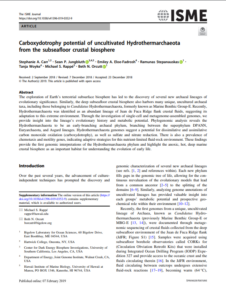Deep-sea microbes can provide clues to the evolution of life on Earth, according to a recent paper in The ISME Journal. Researchers used molecular methods to study these microbes, which thrive in the hot, oxygen-free fluids that flow through Earth’s crust.
Called Hydrothermarchaeota, this group of microbes have never been cultivated in a laboratory for study. A research team from Bigelow Laboratory for Ocean Sciences, the University of Hawaii at Mānoa, and the Department of Energy Joint Genome Institute bypassed the problem of cultivation with genetic sequencing methods called genomics.
The researchers found that Hydrothermarchaeota may obtain energy by processing carbon monoxide and sulfate. The microbes use energy from this process to grow as a form of chemosynthesis.
[smlsubform prepend=”GET THE SAFETY4SEA IN YOUR INBOX!” showname=false emailtxt=”” emailholder=”Enter your email address” showsubmit=true submittxt=”Submit” jsthanks=false thankyou=”Thank you for subscribing to our mailing list”]
Hydrothermarchaeota evolved early in the history of life on Earth. These observations suggest that the subsurface ocean crust is an important habitat for understanding how life evolved on Earth, and possibly other planets.
The researchers also found genetic evidence that Hydrothermarchaeota have the ability to move on their own. Motility offers an importnat survival strategy for the extreme environment they call home, which has a limited supply of nutrients essential to life.
Stephanie Carr, first author on the paper and a former postdoctoral researcher with Orcutt who is now an assistant professor at Hartwick College, commented:
Studying these unique microbes can give us insights into both the history of Earth and the potential strategies of life on other planets. Their survival strategies make them incredibly versatile, and they play an important, overlooked role in the subsurface environments where they live
The researchers will build upon this discovery to continue investigating the extreme microbes thriving below the seafloor. Orcutt will lead a cruise using ROV Jason with this team of researchers to explore the subseafloor environment.
See more information in the PDF herebelow


































































